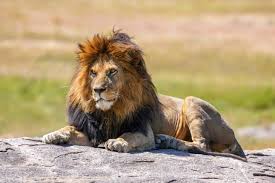The killing of a collared lion involved in a research project in Zimbabwe by a trophy hunter has been condemned by wildlife groups, echoing the infamous case of a lion called Cecil whose death at the hands of an American tourist in the same country a decade ago was met with international outrage.
The latest lion, known as Blondie, was part of an Oxford University study and wore a research collar sponsored by Africa Geographic, a safari company.
Africa Geographic said Blondie was killed by a hunter in June close to the country’s flagship Hwange National Park after being lured out of a protected area and into a nearby hunting zone with the use of bait.
After Blondie’s killing became a new rallying cry for those opposed to hunting, a spokesperson for Zimbabwe’s National Parks told The Associated Press on Thursday that the hunt was legal and the hunter had the necessary permits. Zimbabwe allows up to 100 lions to be hunted a year.
Trophy hunters, who are usually foreign tourists, pay tens of thousands of dollars to kill a lion and take the head or skin as a trophy.
Africa Geographic CEO Simon Espley said Blondie’s killing made “a mockery of the ethics” trophy hunters claim to prescribe to because he wore a clearly visible research collar and was a breeding male in his prime. Hunters say they only target ageing, non-breeding lions.
“That Blondie’s prominent collar did not prevent him from being offered to a hunting client confirms the stark reality that no lion is safe from trophy hunting guns,” Espley said.
Hunting lions is fiercely divisive, even among conservationists. Some say if it is well managed it raises money that can be put back into conservation. Others want killing wildlife for sport to be banned outright.
Some countries in Africa like Kenya have commercial hunting bans, others like Zimbabwe and South Africa allow it. Botswana lifted a ban on hunting six years ago.
Tinashe Farawo, the spokesperson for the Zimbabwe parks agency, said money from hunting is crucial to support the southern African nation’s underfunded conservation efforts. He defended the hunt and said they often happen at night, meaning the collar on Blondie may not have been visible.
He said he had no information on Blondie being lured out of the park with bait — which is usually a dead animal — but there “is nothing unethical or illegal about that for anyone who knows how lions are hunted. This is how people hunt.”
“Our rangers were present. All paperwork was in order. Collars are for research purposes, but they don’t make the animal immune to hunting,” Farawo said. He declined to name the hunter.
GNA



